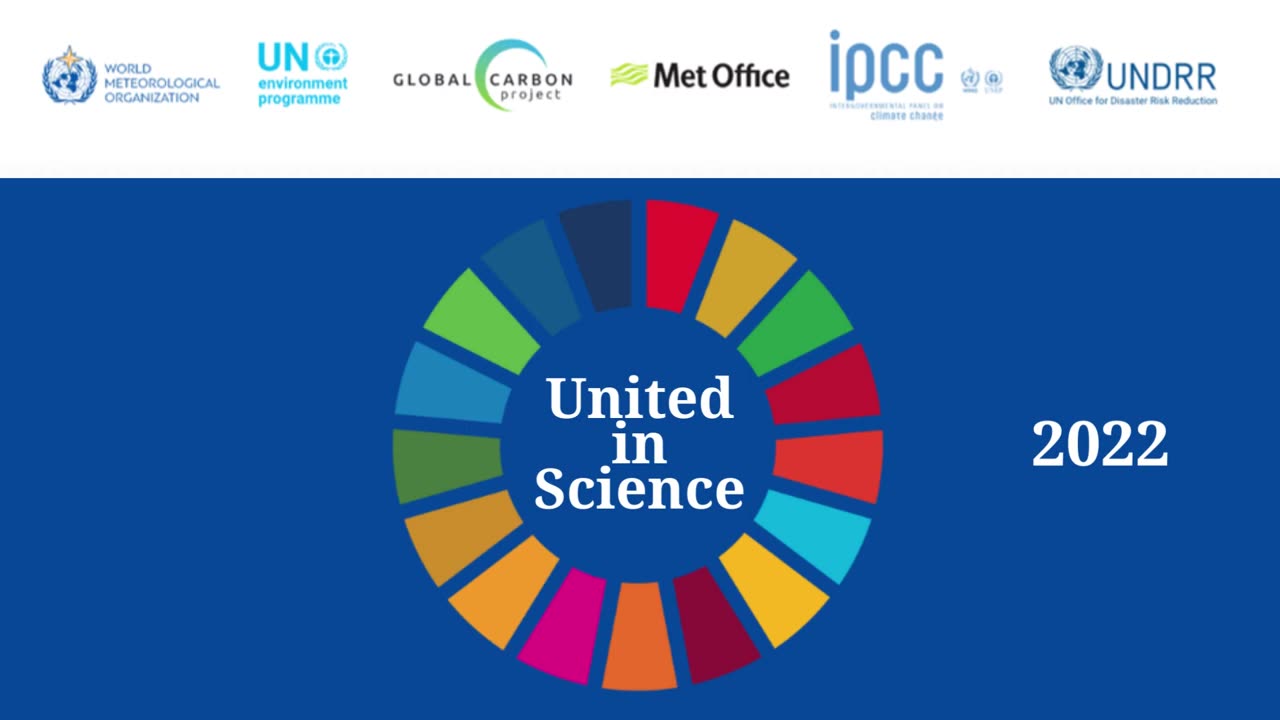Premium Only Content

United In Science - 2022 English Animation
About,
Climate change is one of the most pressing issues facing humanity today. It is a #global problem that requires a global response, and the scientific community has a critical role to play in helping to understand and address the issue. To that end, several leading global scientific organizations and bodies, including the World Meteorological Organization (WMO), the United Nations Environment Programme (UNEP), the Intergovernmental Panel on Climate Change (IPCC), the Global Carbon Project, the Future Earth program, and others, have come together to produce the "United in Science" report. This report provides a comprehensive and up-to-date assessment of the latest scientific findings related to climate change and its impacts, as well as the actions that are being taken to address the issue.
The first edition of the "United in #Science" report was released in September 2019, ahead of the United Nations Climate Action Summit. The report highlighted the accelerating pace of climate change and the urgent need for countries to step up their efforts to reduce greenhouse gas emissions and limit global warming to well below 2°C above pre-industrial levels, as agreed in the Paris Agreement. The report also noted that the impacts of climate change were already being felt around the world, with record-breaking heatwaves, wildfires, and hurricanes, as well as melting glaciers and rising sea levels.
The second edition of the report was released in September 2020, and it provided updated information on the state of the climate, including the impacts of COVID-19 on greenhouse gas emissions and the progress made towards achieving the goals of the Paris Agreement. The report emphasized the need for a green recovery from the pandemic, with investments in clean energy and sustainable infrastructure. The report noted that while the pandemic had led to a temporary reduction in greenhouse gas emissions, these reductions were not sufficient to achieve the long-term goals of the Paris Agreement. The report also highlighted the importance of addressing the systemic inequalities that have contributed to both the climate crisis and the pandemic.
The "United in Science" report draws on a wide range of scientific evidence to provide a clear picture of the state of the climate. The report notes that the average global temperature has already risen by about 1.1°C above pre-industrial levels, and that this warming is expected to continue in the coming decades, even if greenhouse gas emissions are reduced. The report also highlights the role of human activities, particularly the burning of fossil fuels, in driving this warming.
The report notes that the impacts of climate change are already being felt around the world, with more frequent and intense heatwaves, droughts, floods, and storms. These impacts are having significant social and economic consequences, particularly for the most vulnerable communities. The report also notes that the impacts of climate change are likely to become more severe in the coming decades, even if greenhouse gas emissions are reduced. This highlights the urgent need for countries to take action to adapt to the impacts of climate change, as well as to mitigate greenhouse gas emissions.
The "United in Science" report also provides an overview of the actions that are being taken to address the issue of climate change. The report notes that while progress has been made in some areas, overall, global greenhouse gas emissions continue to rise. The report highlights the importance of a coordinated global response to the issue, with all countries taking action to reduce their emissions and transition to a low-carbon economy. The report also emphasizes the need for increased investment in clean energy and sustainable infrastructure.
In conclusion, the "United in Science" report provides a critical assessment of the latest scientific findings related to climate change and its impacts, as well as the actions that are being taken to address the issue. The report highlights the urgent need for countries to take action to reduce greenhouse gas emissions and limit global warming to well below 2°C above pre-industrial levels, as agreed.
@wmo
@science
-
 8:17
8:17
VSOGunChannel
14 hours ago $0.38 earnedYou Were Put on a Government Watch List || DECLASSIFIED
5.1K2 -
 35:14
35:14
Steph & Kayls
16 hours ago $0.34 earnedSpicing Things Up: How To Navigate Adding A Third To The Bedroom | Ep. 4
6.68K4 -
 28:59
28:59
Film Threat
11 hours agoTHUNDERBOLTS* EARLY REACTIONS | Film Threat After Dark
15.7K4 -
 8:02:12
8:02:12
Rebel News
4 days ago $211.98 earnedELECTION NIGHT LIVE: Rebel News Canada coverage with Ezra Levant, Sheila Gunn Reid & Special Guests
425K229 -
 1:24:54
1:24:54
Badlands Media
15 hours agoBaseless Conspiracies Ep. 130: Iberia Blackout, Green Energy Failures, and Grave-Robbing Government Experiments
83.5K31 -
 2:12:50
2:12:50
FreshandFit
8 hours agoModern Men VS Modern Women
53.8K33 -
 4:17:07
4:17:07
vivafrei
9 hours agoELECTIONS CANADA RESULTS LIVE STREAM WITH VIVA COMMENTARY!!!
132K145 -
 2:39:37
2:39:37
TimcastIRL
10 hours agoDemocrat LAUNCHES IMPEACHMENT Against Trump Citing Deportation, Abrego Garcia Case | Timcast IRL
172K150 -
 2:17:27
2:17:27
IcyFPS
8 hours agoA new legend rises.. Icy vs Teardrop | @playoffthegrid | Team MERC Grind |
31.9K2 -
 8:07:56
8:07:56
TwinGatz
10 hours ago🔴LIVE - Endless Jank | Oblivion Remastered
35.4K